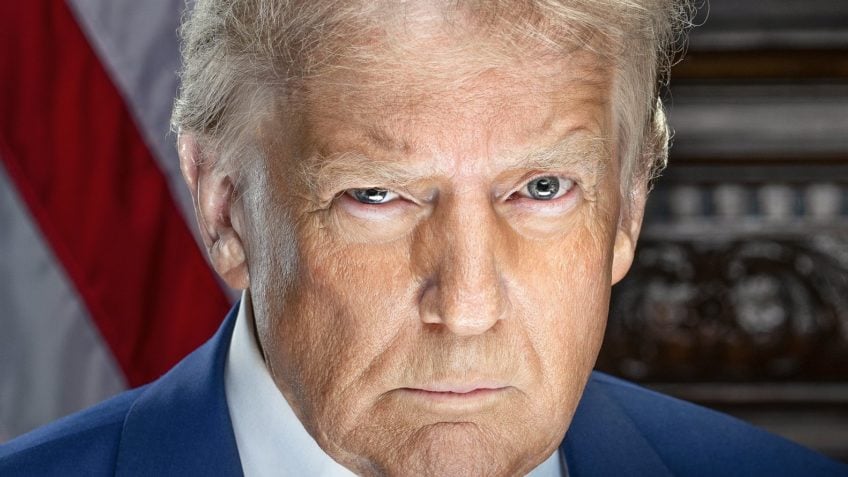
United States President Donald Trump has once again declared that he intends to impose sanctions on all countries that continue to do business with Russia. The statement was made this Sunday (16), in response to questions from journalists about a bill being analyzed in the North American Congress. According to Trump, the proposal has his support and could significantly tighten the pressure already adopted by Washington. The information is from RT.
Asked about the measure, Trump said: “I heard they’re doing that, and that’s fine with me.” The president also said that the project would be “very rigorous”. When citing other nations that could be included in the set of targets, he declared: “You can include Iran in that list (…). I suggested it.” He then toughened his position: “Any country that does business with Russia will be severely sanctioned.”
The speech takes place at a time of intensifying economic pressure from the United States against Moscow, within a context of prolonged tension due to the war in Ukraine and geopolitical disputes in Eastern Europe.
Congress discusses broader punishments for Russia’s trading partners
The proposal mentioned by Trump involves an initiative presented by Republican senator Lindsey Graham, also supported by Democrat Richard Blumenthal. The text authorizes the North American government to apply secondary tariffs of at least 500% to countries that maintain relevant trade relations with Russia. Among the countries potentially affected would be China, India and Brazil, all of which are still linked to Moscow through commercial ties in sectors such as energy, fertilizers and technology.
The proposal could also raise tariffs on Russian products still entering the US market to 500% or more. Although there is no immediate forecast for voting, the process remains active and could move forward at any time.
At the end of October, the Senate majority leader, John Thune, declared that the text was temporarily suspended, but highlighted that the discussion remains on the legislative agenda. Even without new measures approved, the United States has already expanded its set of economic restrictions in recent weeks.
New sanctions on Russian companies
On October 22, Washington applied new sanctions against Rosneft, Lukoil and 34 other subsidiaries of large Russian companies in the energy sector. The justification presented by the North American government is that Moscow would not be showing sufficient commitment to negotiations that could lead to an end to the conflict in Ukraine.
The sanctions directly affect the oil and gas sector, considered fundamental for the Russian economy and its state financing. The measures include asset freezes, transaction restrictions and limitations on companies and banks doing business with listed companies.
On November 13, Secretary of State Marco Rubio stated that the arsenal of US sanctions is close to its limit. According to Rubio, the options available for new restrictions have become “very limited” due to the large number of measures already adopted since the start of the war.
Moscow says it is open to dialogue
Despite the escalation of sanctions and statements from Washington, Russian officials say the country remains willing to negotiate. In September, Kremlin spokesman Dmitry Peskov said Ukraine could return to negotiations on more unfavorable terms if it continues to avoid further talks.
Russian President Vladimir Putin has argued that any lasting agreement must address what he considers structural causes of the conflict. Among the points raised by Putin are the expansion of the North Atlantic Treaty Organization (NATO) towards Russian borders and issues involving Russophone communities on Ukrainian territory.
Peskov also criticized the sanctions policy. In June, he stated that these measures represent “a double-edged sword”. He stated: “The more severe the package of sanctions, which we consider illegal, the more severe the blow in the shoulder, like a gunshot.” The spokesman also said that Moscow will only agree to negotiate based on “logic and arguments”, and not through “any type of pressure or force”.
Possible impacts on the global economy and diplomatic relations
The threat of imposing sanctions on countries that maintain trade relations with Russia increases international concerns about the effects on global trade. Countries such as China and India have strong energy ties with Moscow, while Brazil maintains significant imports of Russian fertilizers, a crucial product for Brazilian agribusiness.
Analysts say that secondary measures, such as those foreseen in the project mentioned by Trump, could generate diplomatic friction and reorganize trade flows in strategic sectors. There is also concern about the impact on production chains and global inflation, especially in sensitive areas such as energy and food.
In the United States, the discussion involves not only foreign policy, but also internal impacts, as higher tariffs on imported products tend to result in additional costs for consumers and companies.
Scenario remains unstable
Trump’s statement adds to a broad set of pressures applied by the United States since the start of the war in Ukraine in 2022. Even with the recognition that the sanctions limit is close, Washington maintains its discourse of expanding Russia’s economic isolation and pushing for the resumption of negotiations.
Moscow, for its part, insists that it will continue to operate regardless of international measures and that its strategic decisions will not be modified by economic reprisals. The scenario continues without signs of easing, with the risk of new measures, diplomatic responses and debates about the impact of sanctions on the geopolitical balance.
Source: https://www.ocafezinho.com/2025/11/17/trump-ameaca-derrubar-paises-que-mantem-relacoes-comerciais-com-a-russia/

